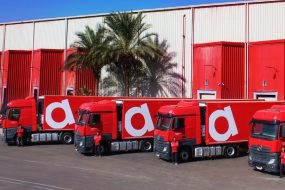

Many fashion businesses need help managing the high volume of expected returns. A poor returns process impacts operational efficiency and risks customer satisfaction and brand reputation. Without a reliable logistics provider with an efficient, well-coordinated reverse logistics process, handling returns can quickly become a significant obstacle to growth. Fashion businesses must secure the proper logistics support to turn returns management from a liability into a competitive advantage.
Reverse logistics explained: What it means for fashion
Reverse logistics (or reverse distribution) involves returning goods through the supply chain from the end consumer to the manufacturer or distributor. It usually occurs when a product has yet to meet the expected standard at the point of sale and needs to be repaired, recycled, remanufactured, or disposed of.
The key aim of reverse logistics is to manage the return process of products from customers to the manufacturer or distributor with a reduced environmental impact.
Why efficient and sustainable returns matter in fashion
An Invesp surveyhas revealed that 30% of products ordered online are often returned to manufacturers. More importantly, 67% of online shoppers check an e-commerce business’s return page policy before placing an order. Therefore, having a reliable reverse logistics operation will be instrumental in meeting customer expectations and acquiring potential sales.
Challenges in reverse logistics
While the global reverse logistics sector proliferates, some notable challenges impede the processes.
High volume of returns
An efficient return process can be complex and costly because of the number of steps involved. It often incorporates processing the packages, freight charges, parcel tracking, recycling or repairing, repackaging, and then completing the delivery process back to the consumer. This can become more challenging when there is a high volume of returns.
Complexity of handling various types of products
The reverse logistics process involves various stakeholders who must collaborate effectively to manage returned defective products. This includes tracking returns, assessing product conditions, and determining the best disposal or refurbishment options. A more robust reverse logistics process can be required for businesses selling multiple product types.
Environmental impact of returns
Reverse logistics can complicate efforts to reduce environmental waste without focusing on sustainability. Companies can address this by repurposing returned goods, prioritising zero-waste packaging, and using eco-friendly disposal methods. These strategies help minimise waste and promote a more sustainable approach to logistics.
Related article: Reduce Emissions, Gain Profits: The Logistics Energy Transition
Efficient returns handling: A game-changer for fashion brands
Efficient reverse logistics ensures that goods are correctly sorted, inspected, and redirected. Businesses can achieve efficient management by:
Streamlining returns processes
A well-optimised reverse logistics and return process drives customer satisfaction and encourages repeat purchases. Implement a Returned Merchandise Authorisation (RMA) system that offers customers clear instructions and pre-paid shipping labels to streamline this process. If the return process is free of charge for the customer, it will significantly enhance their experience and foster loyalty.
Utilising technology for tracking and processing returns
Leveraging technology solutions for parcel tracking in the return process can help enhance efficiency. Returns management software can manage inventory tracking, generate shipping labels automatically, and issue refunds. Automating this process will help reduce the time and resources needed for the return process and improve accuracy.
Implementing effective communication with customers
Communicate with customers before and during product returns. Establish communication standards and objectives to eliminate ambiguity. Businesses can achieve this by selecting appropriate communication channels and tools, providing clear information, and encouraging input and feedback.
Related article: Exploring the Future of Supply Chain Transparency with Blockchain Technology Aramex
Eco-friendly practices in reverse logistics
Eco-friendly practices in reverse logistics, such as optimised transportation methods, reducing the number of raw materials harvested, reusing or recycling these materials, and partnering with sustainable logistics providers, can support businesses in the drive for sustainability. In addition, companies can evaluate the following:
Minimising transportation and packaging waste
Optimising route planning and transportation management systems is a sustainable, cost-effective transport strategy for reverse logistics. These tactics can help minimise fuel consumption and emissions, boost fleet efficiency, and improve logistics performance.
Reselling, refurbishing, or recycling returned products
Reselling returned products helps keep them in circulation and reduces their environmental impact. Third-party companies can also acquire and resell liquidated products from a wide range of sources, recycle them, and reuse them to reduce demand for new ones.
Partnering with sustainable logistics providers
Companies collaborating with sustainable logistics providers, such as Aramex, can leverage transparency and responsible business practices—such as reducing carbon emissions and committing to environmental safety—to build quality customer relationships and loyalty.
Related article: Sustainable Logistics: A guide to the circular economy
Key Takeaway
The fashion industry significantly contributes to global carbon emissions, making sustainability a critical priority. For a greener future, industry stakeholders must take decisive steps, such as collaborating with eco-conscious logistics partners, reducing transportation and packaging waste, and embracing the resale, refurbishment, or recycling of returned items. These efforts are essential for lowering the industry’s environmental footprint and building a more resilient and responsible fashion sector.
Contact ustoday to discover how to manage returns efficiently and sustainably with effective reverse logistics solutions.




